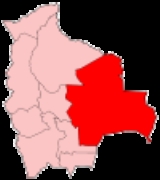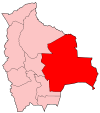
Santa Cruz autonomy referendum, 2008
Encyclopedia

Bolivia
Bolivia officially known as Plurinational State of Bolivia , is a landlocked country in central South America. It is the poorest country in South America...
was held on 4 May 2008. The vote resulted from strains between the Prefecture of Santa Cruz
Santa Cruz Department
Santa Cruz, with an area of 370,621 km², is the largest of the nine constituent departments of Bolivia. In the 2001 census, it reported a population of 2,029,471. The capital is the city of Santa Cruz de la Sierra. The state is one of the wealthiest states in Bolivia with huge reserves of...
and President
President of Bolivia
The President of Bolivia is head of state and head of government of Bolivia. According to the current Constitution, the president is elected by popular vote to a five year term, renewable once...
Evo Morales
Evo Morales
Juan Evo Morales Ayma , popularly known as Evo , is a Bolivian politician and activist, currently serving as the 80th President of Bolivia, a position that he has held since 2006. He is also the leader of both the Movement for Socialism party and the cocalero trade union...
. The referendum was declared illegal and unconstitutional by the National Electoral Court. Final results from the referendum showed that 85.6% of participating voters supported autonomy. Abstention rates were 37.9%. Partisans of the Movement for Socialism
Movement for Socialism (Bolivia)
The Movement for Socialism-Political Instrument for the Sovereignty of the Peoples , alternately referred to as "Movement Toward Socialism" or "Movement to Socialism", is a left-wing, socialist, Bolivian political organization led by Evo Morales, founded in 1995...
called for a boycott of the vote, and the Guarayo, Guaraní, Chiquitano, Ayoreo, Yuracaré-Moxeño indigenous peoples rejected holding the vote in their territories.
The United Nations Office of the High Commissioner for Human Rights stated in its annual human rights report that the referendums: "took place even though the National Electoral Court ruled that the prefectures did not have the authority to call for such a vote and that they were infringing the Constitution." A United Nations
United Nations
The United Nations is an international organization whose stated aims are facilitating cooperation in international law, international security, economic development, social progress, human rights, and achievement of world peace...
mission to Bolivia from the Permanent Forum on Indigenous Issues
United Nations Permanent Forum on Indigenous Issues
The United Nations Permanent Forum on Indigenous Issues is the UN's central coordinating body for matters relating to the concerns and rights of the world's indigenous peoples. "Indigenous person" means native, original, first people and aboriginal. There are more than 370 million indigenous...
later declared that the Santa Cruz autonomy statute "promotes, allows, strengthens and reproduces practices of servitude
Indentured servant
Indentured servitude refers to the historical practice of contracting to work for a fixed period of time, typically three to seven years, in exchange for transportation, food, clothing, lodging and other necessities during the term of indenture. Usually the father made the arrangements and signed...
", referring to conditions of debt-servitude and conditions analogous to slavery that are suffered by some indigenous groups in Santa Cruz. Bartolomé Clavero
Bartolome clavero
Bartolomé Clavero Salvador is a spanish jurist and historian, specialized in legal history.He is a cathedratic at University of Sevilla. His works on usury, majorat or the concept of State in the Ancien regime , with a polemic content and a materialistic point of view, rendered him to be considered...
, a Spanish law professor from the Permanent Forum
United Nations Permanent Forum on Indigenous Issues
The United Nations Permanent Forum on Indigenous Issues is the UN's central coordinating body for matters relating to the concerns and rights of the world's indigenous peoples. "Indigenous person" means native, original, first people and aboriginal. There are more than 370 million indigenous...
later stated that: "Anyone who has voted for this statute supports servitude."
Similar referendums were held in Beni Department
Beni Department
Beni, sometimes El Beni, is a northeastern department of Bolivia, in the lowlands region of the country. It is the second largest department in the country , covering 213,564 square kilometers , and it was created by supreme decree on November 18, 1842 during the administration of General José...
and Pando Department
Pando Department
Pando is a department of Bolivia, with an area of , adjoining the border with Brazil. Pando has a population 66,689 . Its capital is the city of Cobija....
on 1 June 2008 (see Bolivian autonomy referendums, 2008
Bolivian autonomy referendums, 2008
Referendums on departmental autonomy statutes were held in four departments of Bolivia—Beni, Pando, Santa Cruz, and Tarija—in May and June 2008. These four departments, known as the Media Luna, voted in favor of autonomy in the June 2006 elections. The National Electoral Court had blocked the...
) and in Tarija Department
Tarija Department
Tarija is a department in Bolivia. It is located in south-eastern Bolivia bordering Argentina to the south and Paraguay to the east. According to the 2001 census, it has a population of 391,226 inhabitants. It has an area of 37.623 km²...
on 22 June 2008 (see Tarija autonomy referendum, 2008
Tarija autonomy referendum, 2008
An autonomy referendum was held in Tarija Department in Bolivia on 22 June 2008, following the autonomy referendum held in Santa Cruz Department on 4 May 2008 and the autonomy referendums held in Beni Department and Pando Department on 1 June 2008. The referendum was approved with over 80% in...
).

